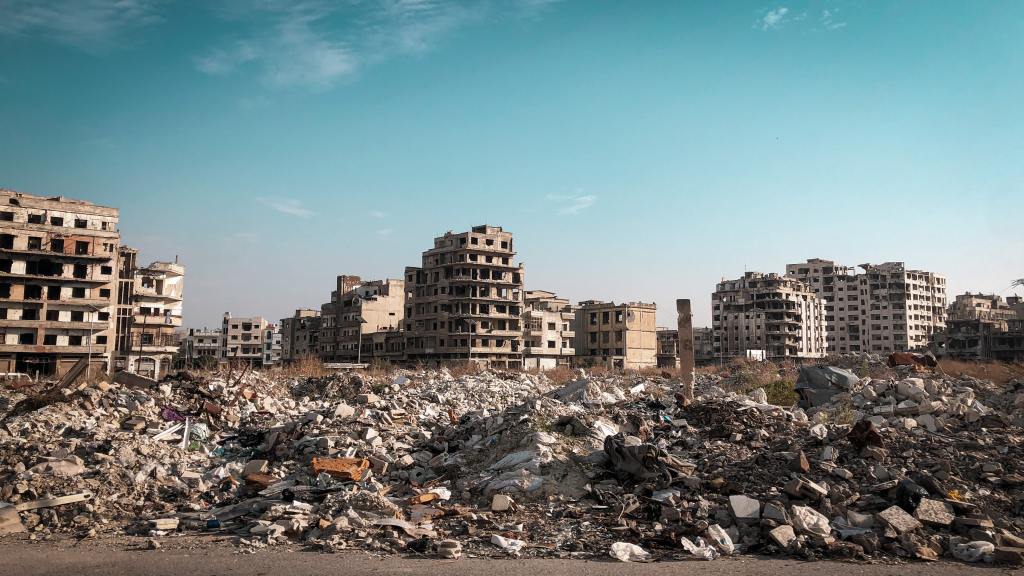By Harriot Grinnell-Moore.
The situation in Syria has become untenable. Rising gas prices, food shortages, a lack of medicine and basic supplies have led to living conditions that can by no means be seen as conditions for the living. The situation across the entirety of Syria is worrying, however much of the attention and aid is focused on Northern Syria which leaves a substantial part of the population forgotten or overlooked.
The Worsening Economic Crisis
Syria is currently facing the most severe economic crisis since the war began, inflation is extremely high and costs are rising. Fuel shortages especially are becoming problematic with lines of trucks at gas stations, not only in Damascus but around the country. The electricity only comes on for a few hours a day, on and off. This has especially dangerous ramifications for health facilities, trying to operate on, and care for the sick. Cooking gas is being rationed. This has only been worsened by the COVID-19 pandemic and economic collapse in Lebanon. There are water shortages in the North of Syria, which is exacerbating the already worrying health conditions in the population, including the spread of COVID-19. Water shortages will sadly become commonplace, worsening year on year with climate change. It is not only vital to address the issue that is currently facing the population, but also to plan to mitigate damage for future generations.

Food shortages and the Impact on Agriculture
Prolonged water shortages have had, and will continue to have, an impact on the agricultural sector as farmers are forced to abandon farmlands and livestock. The World Food Programme has estimated that more than 12.4 million Syrians are now food insecure. Food prices are 29 times higher than their pre-crisis cost. The impact of this can be seen in families’ reduction of food intake, taking children out of school early to work for extra income and a 25% increase in early child marriage. It is vital that instead of only focusing on providing humanitarian aid in the way of immediate food, the agricultural sector in Syria is supported. This ought to be done by supplying them with the elements needed to recommence manufacturing food. This must be done to ensure that ending food poverty in Syria is done sustainably.
The situation in Rukban
Whilst much attention is (rightly) given to the horrendous conditions being suffered in the al-Hol camp, especially given the harsh winter that Syria has been suffering resulting in several deaths in the camp, Rukban is often overlooked in Western media. Rukban is a small southern Syrian camp on the border of Iraq, Jordan, and Syria. Aid is not reaching this camp. Aid was cut off to the camp by the Jordanian government in 2016 which shifted the responsibility of delivering aid onto UN umbrella agencies based in Damascus. There are barriers to getting aid into Rukban due to the aid organisations being based in Damascus as NGOs who are not aligned with or controlled by the government are treated with suspicion. This makes delivering aid into the camp near impossible as deliveries are blocked by President Assad’s government. The last international aid was delivered to Rukban in February 2019. The camp is running dangerously low on food, clean water, and medicine. Despite having a military outpost near to the camp the US refuses to take responsibility for the camp, as does Damascus. The dire reality is that if aid does not reach Rukban in the next days and weeks then both the camp and its residents will not survive. The alternative to the squalid conditions provided by Rukban is to return to government-held areas where they may face arrest or intimidation. The situation in Rukban has forced many into returning despite the consequences.

The Consequences of Sanctions on Civilian Life
The violence and fighting in Syria have devastated infrastructure, and remains a major threat to civilian life. However, some of the most damaging impacts on Syria are coming from US and EU sanctions. The effects of the Caesar Act are now being seen, and they are cruel. The issue with sanctions is that whilst their effect is far-reaching, it can only be seen on the general population. It is innocent civilians that are thus targeted and suffer the consequences of games played far out of their control. Whilst medical supplies may not be officially sanctioned, the trickle-down effect means that in practice they are. This is since Syria manufactures around 80-90% of the necessary medicine within the country but the primary substances which are needed to manufacture these medicines are sanctioned. Thus, Western countries are effectively sanctioning medical supplies and medicine in Syria, alongside hindering their delivery – the impact of which is devastating. This is only one example of how sanctions are destroying the lives of ordinary Syrian civilians, but it is one example too many.
Ultimately, to ensure a safe, stable, and sustainable future for Syrian civilians the coordination of aid has to be made a priority and sanctions must be eased. The Next Century Foundation expresses its deep sadness and solidarity towards the citizens of Syria whose suffering is continuing to worsen. We hope that the US and EU reconsider their stances on sanctions and work with the UN on opening more border crossings to deliver aid into Syria, particularly to the Rukban camp. Without doing this, all sanctions will achieve is, as Ambassador Sami Khiyami of our Syrian Working Group noted, a “divided country, dying population, and a surviving government”.